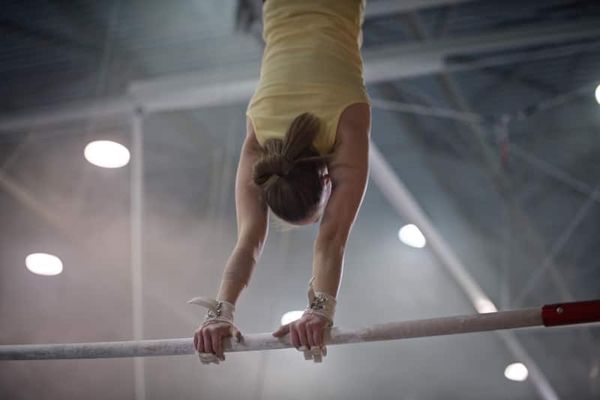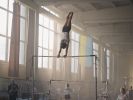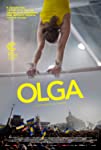Eye For Film >> Movies >> Olga (2021) Film Review
Olga
Reviewed by: Amber Wilkinson

Films from Ukraine are taking on additional resonance at the current moment, with the ongoing Russian invasion of the country, from documentaries like Sundance winner A House Made Of Splinters - about children impacted from the previous conflict in Donbass - to this drama from Elie Grappe, which is being preview-screened at a number of cinemas across the UK from March 18 with profits going to the Disasters Emergency Committee. The star of the film Anastasia Budiashkina - who is a gymnast in real life - fled the country's under-fire Kharkiv herself in recent days for Poland.
The idea of being exiled and of politics having a knock-on impact well outside the confines of parliaments and protests are key elements of Grappe's drama that considers these ideas through the life of young gymnast Olga (Budiashkina), who has moved to Switzerland to train just as the 2014 Revolution of Dignity is gearing up in her homeland. Her Ukrainian journalist mother (Tanya Mikhina) is fully embroiled in events in Kyiv's Maidan Square, while Olga is focused on the European Championships that lie ahead, taking up the offer of citizenship that is offered by her Swiss father's heritage.

Where other filmmakers might focus on the competition arc of this story as events run on as a backdrop, Grappe instead turns her film into a concentrated character study. She captures the physicality and determination of Olga in the gym, where she repeatedly belly flops on a crash mat as she tries to practice the complex Jaeger somersault on the uneven bars, despite being told to not to work on the manoeuvre alone. She also captures the concentration needed to retain focus in the face of not only the challenges of living in a foreign country while learning the language but also what is happening back home - with her old teammate Sasha (Sabrina Rubtsova, also a gymnast) video calling her from the heat of the protests.
Olga is working through this alone and Grappe brings this home to us in all its intensity without over-explanation, as the internal tug-of-war between personal ambition and duty to homeland intensifies. A tattoo of a set of Olympic rings tells us all we need to know about the skills and potential rivalries of a teammate, while a short conversation in a car is all we need to feel the love between mother and daughter, and a transported teddy speaks volumes about adolescent emotions.
The first-time director shows an adept grip when it comes to the rhythms of her craft, letting silence or specific sounds break out at unexpected moments, including a gripping scene when all we can hear is the spring and creak of the uneven bars. Visually, she also delivers, from clouds that echo puffs of chalk in a previous scene to cinematographer Lucie Baudinaud's occasional use of distorted light. These artistic inflections elevate Grappe's coming-of-age tale, while the economical guide to the politics of the period and the matter of fact approach to the scripting from her and co-writer Raphaëlle Desplechin (sister of Arnaud and Fabrice) makes this a film that is accessible for audiences of a similar age to the protagonists as well as older viewers.
Details of the charity screenings can be found on the official site
Reviewed on: 17 Mar 2022
















